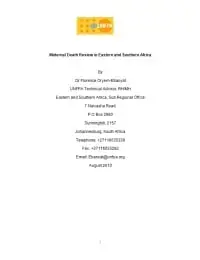Summary
Maternal Death Review (MDR) is a key element for improving the quality of maternal health care services by focusing on the preventable causes of deaths and what could have been done to avert the death. MDR does more than count maternal deaths; it looks beyond the numbers to study the causes and avoidable factors behind each death, leading to actions to improve quality of care and address factors that could have contributed to the death based on the findings. Universal reporting of maternal death is an important element of health management information systems as long as it leads to the allocation of resources to address the gaps.
The process of introducing MDR systematically into all African countries started in 2003 when three UN agencies (WHO, UNFPA and UNICEF) collaborated with development partners and professional bodies to introduce MDR, aiming for institutionalization of MDR at the health system level. Four orientations were held for national MDR committees and programme managers from 34 countries. All countries developed tentative national plans. During the orientations, five MDR methods were introduced: verbal autopsy, facility based MDR (FBMDR), near miss review, confidential enquiry of maternal death and criterion based clinical audit.
In 2007, four years after the first orientations, WHO, UNFPA and UNICEF evaluated MDR progress in 43 countries in sub-Saharan Africa. The objectives of the review were to review progress made in MDR since 2003 and to identify lessons learned and challenges encountered. A report of responses from 40 countries was made. This review in 2010 is a follow up, three years after the first review was done, and covers the countries in the Eastern and Southern Africa Sub-Region (ESA SR).
Findings
Although the use of MDR is increasing in countries in East and Southern African, effective coverage is still low in terms of the establishment of fully functional committees at all levels and the regular reporting and recording of maternal deaths, the review and analysis of data, and taking action to avert deaths due to avoidable factors. The institutionalization of MDR requires political commitment, legal and administrative back up, financial support, capacity development, simplified reporting forms and procedures, co-ordinated support of development partners, involvement of professional bodies, and regular supportive follow up.





